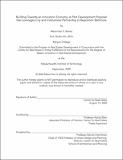Building towards an innovation economy : a pilot development proposal that leverages city and institutional partnership to reposition Baltimore
Author(s)
Beatty, Maximilian S.
Download1227100570-MIT.pdf (52.61Mb)
Other Contributors
Massachusetts Institute of Technology. Center for Real Estate. Program in Real Estate Development.
Advisor
Kairos Shen.
Terms of use
Metadata
Show full item recordAbstract
In the 1950s, Baltimore had reached its peak. The city's geographic location allowed it to thrive during the industrial age as a manufacturing and logistics hub for the United States. Since then, economic downturns, profound racial issues, dysfunctional leadership, and an urban exodus to the suburbs has left Baltimore struggling through a downward spiral. This thesis aims to validate and propose a solution for catalyzing the revitalization of Baltimore by leveraging strategic partnership and real estate development as a tool for change in the city. The thesis is comprised of four distinct sections. Section I provides a historical overview of the events and circumstances that shaped Baltimore. Section II presents a series of economic trends and forces that shape the development strategy for the city, which utilizes the biomedical research activity at Johns Hopkins to design and program effective urban centers. Section III proposes a pilot development project that makes an immediate impact on the East Baltimore community while supporting the growth of the biotechnology and life sciences industries locally to generate lasting benefits to the city. Finally, Section IV projects the future potential resulting from the execution of the proposed pilot and the formation of the cross-functional partnerships that are required for its delivery. The analysis focuses primarily on collaboration between the City, Johns Hopkins University, and a development partner driven by alternative measures of project success and outcomes. By aligning on desired commitments and returns, a highly efficient and productive form of project is made possible to trigger a transformation of Baltimore City.
Description
Thesis: S.M. in Real Estate Development, Massachusetts Institute of Technology, Program in Real Estate Development in conjunction with the Center for Real Estate, September, 2020 Cataloged from student-submitted PDF of thesis. Includes bibliographical references (pages 164-169).
Date issued
2020Department
Massachusetts Institute of Technology. Center for Real EstatePublisher
Massachusetts Institute of Technology
Keywords
Center for Real Estate. Program in Real Estate Development.